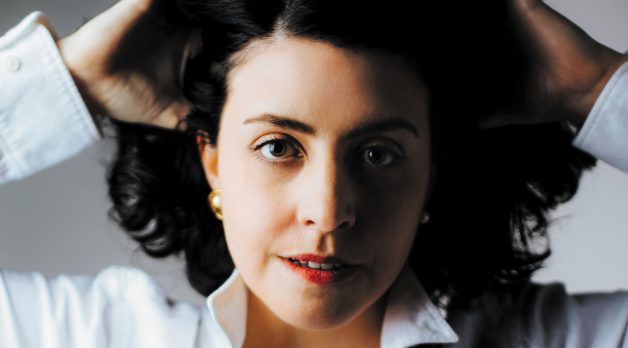Meghan Fredrich
 Meghan Fredrich
Meghan Fredrich
For years, Meghan Fredrich was happily working in advertising, which she majored in at Emerson College, and then, suddenly, she got very sick. The details aren’t important: She saw doctors, went through treatment and eventually began to recover. Instead of feeling revitalized after recuperating, she endured a profound sense of boredom. Fredrich resolved to make a change, and at the age of 30 decided to become a filmmaker: “It was as if I reached a certain point of returning to life with that decision.”
The 34-year-old’s debut short documentary, Deborah Harry Does Not Like Interviews, displays skills informed by Fredrich’s background in advertising. The Massachusetts-based filmmaker dug through hours of archival footage, distilling into 17 minutes a history of the Blondie lead singer’s encounters with sexist, demeaning or just simply ridiculous interview situations — a timeline that’s also commentary on the depiction of women in the media and the ephemerality of pop stardom. There was no shortage of redundant material, and Fredrich was careful to make the clips captivating: “In advertising, you’re taught that you have two seconds to get someone’s attention. I asked myself, ’How can I keep it always interesting and slightly unpredictable even though the questions are repetitive?’”
Fredrich has always appreciated documentaries. She especially loves the “warm and humane” aura of Agnès Varda’s Mur Murs, Adam Curtis’s “understandable” HyperNormalisation and Mary Ellen Mark’s “big gift,” Streetwise. These are films she admires for various reasons, but particularly because they examine “big social forces and how those operate on a small scale in people’s day-to-day lives.”
Fredrich formed Public Interest Productions with her long-term partner, Brent Eveleth. While making Deborah Harry, she decided it would be beneficial for legal and business reasons to have an LLC. The production company’s name evokes a strong ethos, but she finds it goofy: ”Going from advertising to larger production companies, I just assumed everyone came up with a name and a brand. Eventually, I was like, ’Oh, wait, a lot of filmmakers just use their names?’”
The concept of the Deborah Harry short emerged when she began to think about the inherent power imbalance within the interview dynamic. “There’s a tension — two people talking to each other, then an entire audience watching the interaction.” During the editing process, Fredrich focused not on Harry’s answers — which she often carefully omits — but instead on her nonverbal responses. “That split-second reaction she would have before she collected herself and gave a response — I was just watching her eyes and listening to the uncomfortable noises she made or her shift in her seat.”
The process of compiling footage, editing it and submitting the finished film to festivals was faster than she expected. What began as a kernel of an idea in October 2017 premiered at Maryland Film Festival in May 2019. Completion of her next project won’t be as swift. Fredrich is developing a short film that delves into the history of New York City’s East Village through archival footage, which she describes as “a monster of a project” that might take years to complete. That’s fine with her, as she doesn’t care for the spotlight: “What I want more than anything is not for my individual success, but for there to be a community of support for independent filmmakers.” — NK/Photo by Adrienne Mathiowetz
Contact:
